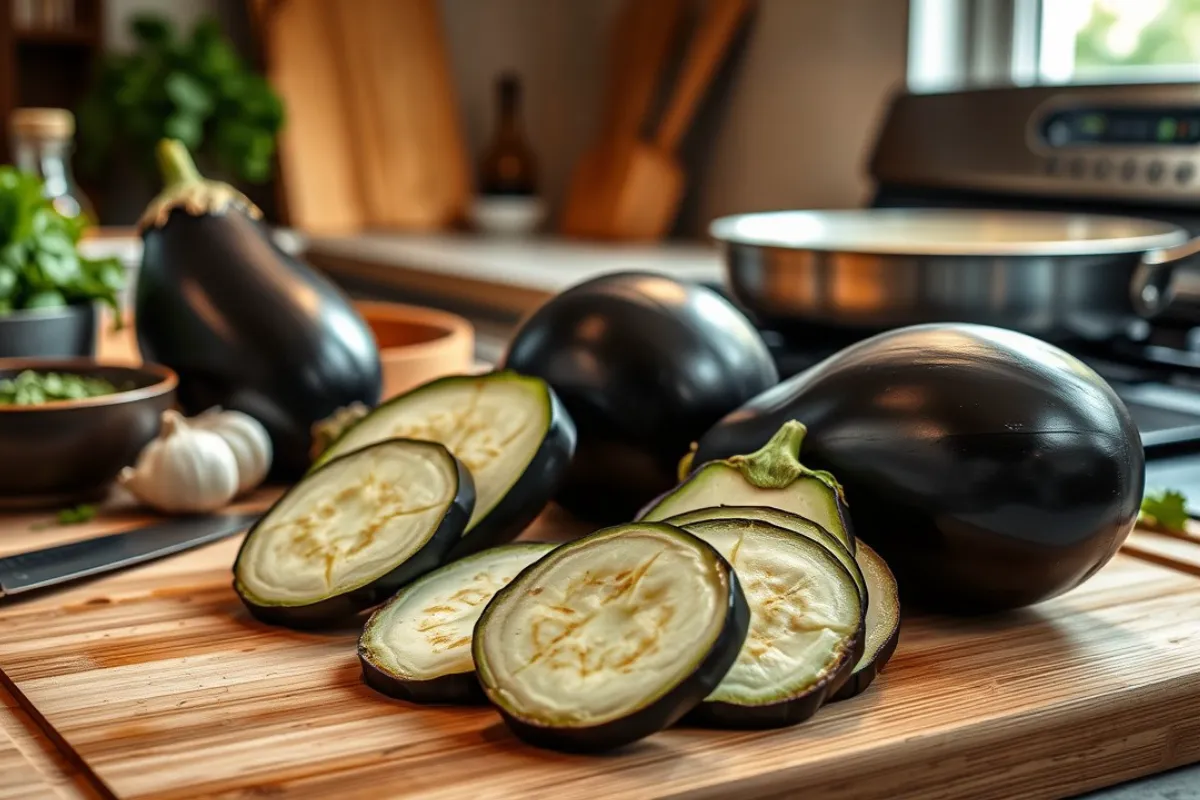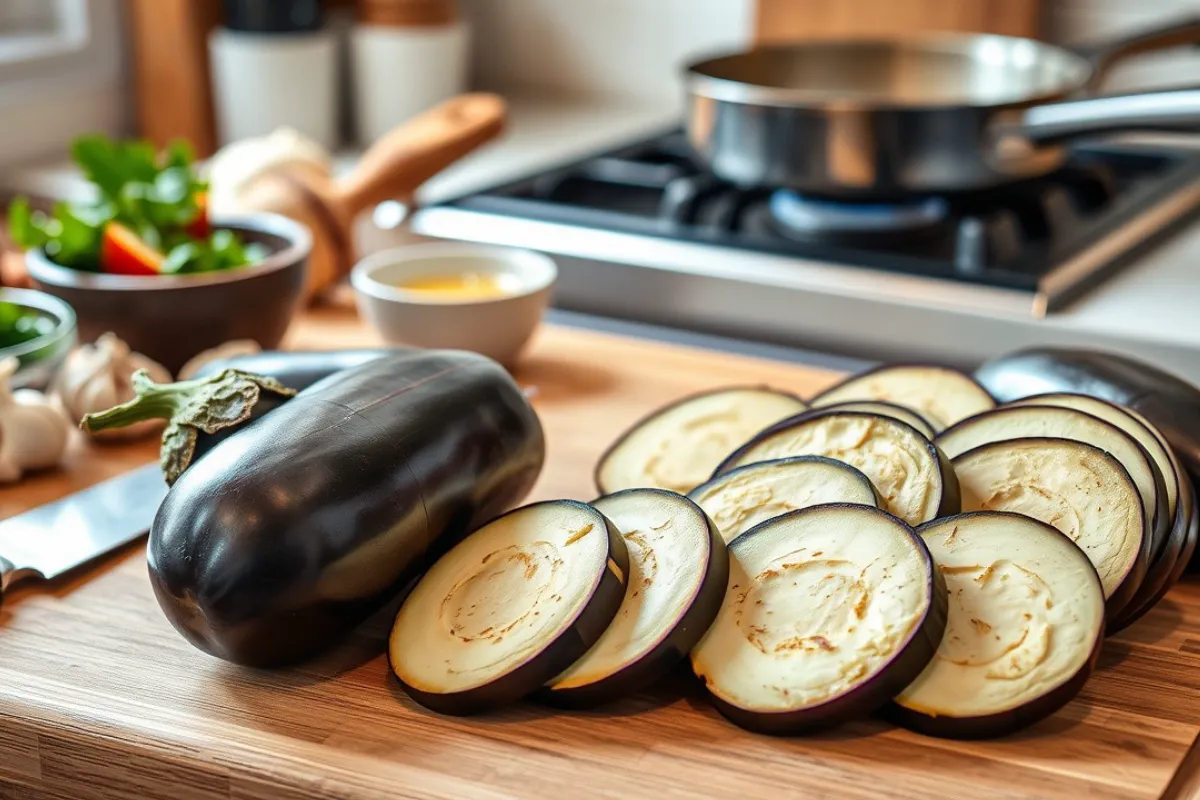Introduction
Eggplant, also known as aubergine, is a versatile vegetable that has found its way into countless culinary traditions worldwide. Whether it’s the star of a Mediterranean ratatouille, the hearty filling in a Middle Eastern baba ganoush, or the savory centerpiece in an Italian eggplant Parmesan, this humble vegetable offers endless possibilities. However, there’s an age-old culinary debate about whether or not to salt eggplant before cooking. Traditionally, many recipes recommend salting eggplant to remove bitterness and reduce water content, but recent culinary trends and studies suggest that this step may not always be necessary. In this article, we’ll delve deep into why you might skip salting eggplant before cooking, exploring the science, benefits, and potential downsides.
The Origins of Salting Eggplant
Historical Reasons for Salting Eggplant
Salting eggplant is a practice that dates back centuries, rooted in the belief that this step is necessary to draw out the vegetable’s natural bitterness. Historically, eggplants were bred in varieties that contained higher levels of solanine, a compound responsible for bitterness and, in large quantities, toxicity. In ancient culinary traditions, salting was seen as a way to make eggplant more palatable, particularly in regions where the vegetable was a dietary staple.
How Salting Impacts Bitterness
When salt is applied to eggplant slices, it draws out moisture through osmosis, which is believed to carry some of the bitter compounds out of the vegetable. This process, often referred to as “degorging,” was especially important for older varieties of eggplant, which could be unpleasantly bitter if not treated properly.
The Influence of Eggplant Varieties on Bitterness
Not all eggplants are created equal when it comes to bitterness. Traditional varieties, particularly those found in Asia and Europe, were known for their strong flavors and sometimes harsh bitterness. Over time, as eggplant cultivation spread across the world, breeders began to select for traits like mildness and sweetness, leading to the less bitter varieties we often find in grocery stores today.
Related Reading: How to Choose the Best Eggplant at the Grocery Store

Modern Eggplant Varieties and Bitterness
The Evolution of Eggplant Cultivation
Modern agriculture has transformed the humble eggplant from a bitter, wild crop into a smooth, versatile vegetable with a wide range of culinary applications. Advances in selective breeding have allowed farmers to reduce the levels of bitter compounds, making it less necessary to salt eggplants before cooking.
Are Modern Eggplants Less Bitter?
Today’s eggplants are generally less bitter than their historical counterparts. This is largely due to the development of hybrid varieties that focus on flavor and texture. The result is a vegetable that, for many cooks, doesn’t require the traditional salting process to enjoy its full potential.
The Role of Genetics in Eggplant Bitterness
The reduction in bitterness in modern eggplants can be attributed to genetic modifications that have lowered the levels of certain alkaloids, including solanine. These genetic changes have allowed for the development of eggplants that maintain their flavor without the harsh bitterness that was once a common complaint.
How Salting Affects Eggplant Texture
Understanding the Texture of Eggplant
Eggplant is unique in its texture, with a spongy interior that can absorb a significant amount of oil and other flavors. This texture can vary depending on how the eggplant is prepared and cooked, with some methods leading to a soft, silky finish and others resulting in a firmer bite.
The Impact of Salting on Texture
Salting eggplant can affect its texture in several ways. By drawing out moisture, salting can lead to a firmer, less spongy texture that many chefs prefer, particularly when frying. This process can also help reduce the amount of oil the eggplant absorbs during cooking, resulting in a lighter dish.
Does Salting Improve the Cooking Process?
For some cooking methods, such as frying, salting can make a noticeable difference in the final texture of the eggplant. However, for other methods like roasting or grilling, the benefits of salting are less pronounced, and the step can often be skipped without affecting the outcome.
Further Reading: The Best Ways to Cook Eggplant Without Frying
Flavor Considerations
How Salting Influences Flavor
Salting not only affects the bitterness and texture of eggplant but also its overall flavor profile. Salt is a natural flavor enhancer, and pre-salting eggplant can lead to a more intense taste. However, for dishes that rely on a delicate balance of flavors, salting can sometimes overpower the other ingredients.
The Role of Seasoning in Eggplant Dishes
While salting can enhance the flavor of eggplant, it’s important to consider the overall seasoning of the dish. In many cases, other spices, herbs, and ingredients can achieve the desired flavor profile without the need for pre-salting.
Balancing Flavors Without Salting
For those who prefer to avoid salting, it’s still possible to create flavorful eggplant dishes by focusing on complementary seasonings and cooking techniques. Using fresh herbs, aromatic spices, and a variety of cooking methods can bring out the natural flavors of eggplant without relying on salt.
Related: How to Season Eggplant Without Using Salt
Nutritional Aspects
Nutritional Benefits of Eggplant
Eggplant is low in calories and packed with nutrients, including vitamins C and K, fiber, and antioxidants. It’s also a good source of phytonutrients, which have been linked to various health benefits, including reduced inflammation and improved heart health.
How Salting Affects Nutritional Content
Salting eggplant can impact its nutritional content by reducing the amount of water-soluble vitamins and minerals. Additionally, salting adds sodium to the vegetable, which may be a concern for those on a low-sodium diet or individuals looking to reduce their salt intake for health reasons.
Sodium Intake Considerations
While salting eggplant can improve its flavor and texture, it’s important to consider the additional sodium it introduces. For those monitoring their sodium intake, skipping the salting step or rinsing the eggplant after salting can help reduce the overall sodium content of the dish.
Explore More: The Impact of Sodium on Health: What You Need to Know
The Science Behind Salting
Osmosis and Moisture Extraction
The process of salting eggplant relies on osmosis, where water moves out of the eggplant cells due to the higher concentration of salt outside the cells. This loss of moisture not only reduces bitterness but also changes the texture of the eggplant, making it firmer and less likely to absorb oil.
How Salting Alters Cooking Times
Salting can also affect cooking times by reducing the water content of the eggplant. A drier eggplant cooks faster and may brown more evenly, which can be particularly desirable in dishes where a crispy texture is needed.
The Scientific Perspective on Bitterness Removal
Scientific studies have shown that the bitterness in eggplant is due to compounds like solanine. While salting can reduce the concentration of these compounds, it’s worth noting that modern eggplant varieties contain lower levels of bitterness, making this step less critical for achieving a pleasant taste.
Scientific Insights: The Role of Solanine in Vegetables
Alternative Methods to Salting
Cooking Techniques That Negate the Need for Salting
For those looking to avoid salting, several alternative cooking techniques can help achieve similar results. Roasting and grilling, for example, can enhance the natural sweetness of eggplant and create a desirable texture without the need for pre-salting.
Blanching, Baking, and Grilling as Alternatives
Blanching eggplant in boiling water before cooking can soften its texture and reduce bitterness without the need for salt. Similarly, baking or grilling eggplant can help concentrate its flavors while maintaining a tender, non-bitter interior.
The Use of Spices and Herbs
Spices and herbs can be powerful tools in cooking eggplant without salting. Ingredients like garlic, cumin, paprika, and fresh basil can add depth and complexity to eggplant dishes, allowing the vegetable’s natural flavors to shine without the need for added salt.
Check Out: Top Herbs and Spices for Enhancing Vegetable Dishes
Regional Culinary Practices
Salting Practices in Mediterranean Cooking
In Mediterranean cuisine, where eggplant is a staple ingredient, salting is often recommended for dishes like moussaka or eggplant Parmesan. However, many modern chefs in this region are moving away from this practice, relying instead on high-quality, less bitter eggplant varieties and alternative cooking methods.
Eggplant Preparation in Asian Cuisines
Asian cuisines, particularly in countries like China and Japan, often skip the salting step altogether. Instead, eggplant is typically stir-fried or steamed, methods that naturally soften the vegetable and bring out its sweet, umami flavors.
Modern Approaches in Western Cuisine
In Western cooking, the trend is shifting towards less salting and more emphasis on natural flavors and textures. Many chefs advocate for using the freshest, highest quality eggplant available and cooking it in ways that highlight its inherent qualities without the need for salting.
Learn More: The Art of Cooking Vegetables in Asian Cuisine

Common Misconceptions
Debunking Myths About Eggplant Bitterness
One of the most common misconceptions is that all eggplants are bitter and must be salted to be edible. In reality, modern eggplants are much milder, and with proper cooking techniques, they can be delicious without the need for pre-salting.
The Influence of Cooking Oils and Methods
Another myth is that eggplant must be salted to prevent it from absorbing too much oil during cooking. While salting can reduce oil absorption, choosing the right cooking method, such as grilling or baking, can achieve similar results without the need for added salt.
Understanding When Salting Is Truly Necessary
Salting eggplant is not always necessary and can sometimes be skipped without any negative effects on the final dish. Understanding when salting is beneficial and when it’s not can help home cooks make more informed decisions in the kitchen.
Read Also: The Best Cooking Oils for Frying Vegetables
Expert Opinions
Insights from Chefs and Culinary Experts
Many chefs today recommend skipping the salting step for most eggplant dishes, especially when using modern varieties. They argue that with the right cooking techniques, eggplant can be just as flavorful and enjoyable without the added sodium.
Scientific Studies on Eggplant Bitterness
Research on eggplant bitterness supports the idea that modern varieties are less bitter and do not require salting in most cases. These studies suggest that the traditional practice of salting may be more of a habit than a necessity in contemporary cooking.
Practical Advice for Home Cooks
For home cooks, the best approach may be to experiment with both salted and unsalted eggplant to determine personal preference. Trying different cooking methods and seasonings can also help achieve the desired taste and texture without relying on salting.
Discover More: Culinary Tips from Top Chefs
Cooking Without Salting
Step-by-Step Guide to Cooking Eggplant Without Salting
- Choose the right eggplant: Look for firm, smooth eggplants without blemishes or soft spots.
- Prepare the eggplant: Cut the eggplant into slices, cubes, or other desired shapes.
- Cook using high heat: Roasting, grilling, or sautéing at high temperatures can help enhance the natural flavors.
- Use flavorful seasonings: Incorporate herbs, spices, and aromatics to add depth to the dish.
- Monitor cooking time: Cook until the eggplant is tender but not mushy, adjusting the time based on the method used.
Recipes That Don’t Require Salting
- Grilled Eggplant with Garlic and Herbs
- Roasted Eggplant with Tahini Sauce
- Stir-Fried Eggplant with Soy Sauce and Ginger
- Baba Ganoush Without Salting
Tips for Achieving Perfect Texture and Flavor
- Use fresh eggplants: Older eggplants are more likely to be bitter.
- Don’t overcrowd the pan: Ensure that eggplant pieces are evenly spaced to allow proper browning.
- Experiment with cooking methods: Try roasting, grilling, or steaming to find your preferred texture.
Recommended Reading: Perfecting Eggplant Dishes: A Guide for Home Cooks
When You Should Salt Eggplant
Scenarios Where Salting Is Beneficial
While salting is often unnecessary, there are certain situations where it can be beneficial. For example, when preparing dishes that require a very firm texture, such as deep-fried eggplant or eggplant Parmesan, salting can help achieve the desired result.
Traditional Dishes That Rely on Salted Eggplant
Some traditional recipes, like ratatouille or caponata, may call for salted eggplant to achieve a specific flavor and texture. In these cases, salting can be an important step in replicating the authentic taste of the dish.
How to Properly Salt Eggplant If Needed
- Slice the eggplant: Cut the eggplant into the desired shape.
- Apply salt: Sprinkle both sides of the eggplant slices with a generous amount of salt.
- Let it sit: Allow the eggplant to sit for 30 minutes to an hour to draw out moisture.
- Rinse and dry: Rinse the eggplant thoroughly under cold water to remove excess salt, then pat dry with a paper towel.
Learn More: How to Prepare Eggplant for Cooking
Environmental and Ethical Considerations
Reducing Food Waste by Skipping Salting
Salting can lead to unnecessary food waste, as the process often involves discarding the water that is drawn out. By skipping this step, you can reduce waste and make more sustainable choices in the kitchen.
The Environmental Impact of Salt Production
Salt production has a significant environmental impact, including energy use and habitat disruption. By reducing or eliminating the use of salt in cooking, you can contribute to more environmentally friendly practices.
Ethical Cooking Practices
Ethical cooking involves making choices that are good for both your health and the planet. By skipping unnecessary steps like salting, you can create delicious, nutritious meals while minimizing your environmental footprint.
Further Reading: The Ethics of Sustainable Cooking
Conclusion
Salting eggplant before cooking has long been a tradition in many kitchens, but it’s not always necessary. Modern eggplant varieties are less bitter, and with the right cooking techniques, you can achieve delicious, flavorful dishes without the need for salting. Whether you choose to salt or not, understanding the reasons behind this practice can help you make more informed decisions in the kitchen. So the next time you prepare eggplant, consider experimenting with unsalted methods to discover new flavors and textures.
Related Post: Top Tips for Cooking Vegetables Perfectly
FAQs
Is it ever necessary to salt eggplant before cooking?
While it’s not always necessary, salting can be beneficial in certain recipes that require a firmer texture or reduced moisture content.
What happens if you don’t salt eggplant?
If you don’t salt eggplant, you may notice a slightly different texture, but modern eggplants are generally mild enough that bitterness is not an issue.
Are there specific recipes that require salting eggplant?
Traditional recipes like eggplant Parmesan or fried eggplant often benefit from salting, but many modern recipes can be made without this step.
How can you tell if an eggplant is bitter?
Older or overripe eggplants are more likely to be bitter. Look for firm, smooth-skinned eggplants to avoid bitterness.
Can you salt eggplant after cooking?
Salting eggplant after cooking won’t reduce bitterness or moisture content, but it can enhance the flavor of the finished dish if needed.

